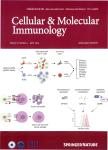Antisense-Induced Blockade of GATA-3 Expression Could Inhibit Th2 Excursion of Tumor Cells in vitro and in vivo
Antisense-Induced Blockade of GATA-3 Expression Could Inhibit Th2 Excursion of Tumor Cells in vitro and in vivo作者机构:Institute of Immunology School of Life Sciences University of Science and Technology of China Hefei 230027 China.
出 版 物:《Cellular & Molecular Immunology》 (中国免疫学杂志(英文版))
年 卷 期:2005年第2卷第3期
页 面:189-196页
核心收录:
学科分类:1002[医学-临床医学] 100214[医学-肿瘤学] 10[医学]
主 题:GATA-3 antisense RNA tumor cell Th1/Th2 cytokine and transcription factor
摘 要:Previous studies have shown that tumor cells predominantly express Th2 type cytokines and transcription factors. GATA-3, as a Th2-specific transcription factor, plays a central role in positive-regulating Th2 development. So whether the expression of GATA-3 in tumor cells has any effect on tumor development is a question of interest. In the present study, we inhibited the expression of GATA-3 in tumor cells through antisense RNA blockade technique, and observed its effects on tumor in vitro and in vivo. Our results showed that antisense GATA-3 treatment could inhibit the expression of TNF-α and Th2 cytokines in tumor cells, and antisense-induced blockade of GATA-3 could also depress tumor growth in tumor-bearing mice. We suggest that the ratio of T-bet/GATA-3 can be evaluated as a more important marker of the status of Thl/Th2 type. And our results might provide some evidence about the molecular regulatory mechanisms in tumor cell development. Cellular & Molecular Immunology. 2005 ;2(3 ): 189-196.



